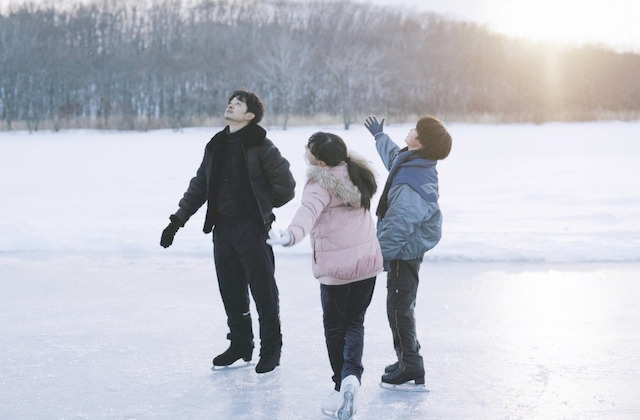 HIROSHI OKUYAMA: MY SUNSHINE ぼくのお日さま (2024 ) JAPAN CUTS 2025A pair of young figure skaters who weren't
HIROSHI OKUYAMA: MY SUNSHINE ぼくのお日さま (2024 ) JAPAN CUTS 2025A pair of young figure skaters who weren'tHiroshi Okuyama's
My Sunshine is so consciously stylish it subdues everything to its boxy format, desaturated color, stinginess with closeups, and moments of stillness or silence. So maybe it creeps up on you when young fun and competition and really a whole adult adult life are all wrecked by the homophobia of a girl who learns her skating coach is gay. What can you say? The Japanese are uneven in their acceptance, and this takes place in a small town atmosphere on the island of Hokkaido.
The restrained style subdues feeling too, not unusual for a Japanese setting; but there is sadness and some rage in it, though some reviewers seem at times to want to see only sweetness and wonder at how "Rarely has figure skating been shown as so pure, poetic and sensual" (as Clarence Tsui dedlares up front in his
review[). Yet this is true; you feel the joy of figure skating in scenes here. When they're happening, they take over, and the restrained styilishness doesn't matter.
"
My Sunshine revolves around Takuya (Keitatsu Koshiyama), a stammering boy who is as awkward at sport as he is with his speech" (Tsui puts it). The stammer is bad. The awkwardness is overread by some reviewers though, I think. What's more true is that Takuya, who's a hockey goalie in winter and plays baseball in the summer, is looking for his dream sport. He gets injured playing the goalie and it really hurts. He finds that dream when on the hockey rink he sees Sakura (Kiara Takanashi), a girl his age, twirling around gracefully, and Arakawa (Sosuke Ikematsu), once a figure skating star, coaching her.
Arakawa sees Takuya's efforts to figure skate in his hockey skates, with frequent but determined falls, and starts to coach him, free, lending him a pair of real figure skates. It's only a quick step to coaching Takuya and Sakura together as a oaur with the conscious ambition of preparing them for competition. This is a wonderfully complicated situation. Arakawa sees himself in Tatsuya. He may see the son he may never have. It seems pure delight for Tatsuya. It all began with his adoration from afar for Sakura's skating, and now he's allowed to hold her hand and glide on the ice with her. While for Sakura it's a hard drive for a pushy mom, Takura has an indulgent father and is doing this out of pure enthusiasm. (Given that he masters these moves, it's wrong to think he was ever unathletic.)
The intended emotional highpoint of the film before the gradual decline is the montage-intense sequence at the frozen pond, a moment rather too gushy for such an otherwise restrained film, where Arakawa skates playfulllly along with Takuya and Sakura while music plays loud from Arakawa's Volvo station wagon and they just have fun and smile. Is Sakura also smiling? Then yes; but Kiara Takanashi, as directed here anyway, is a stony type, her failure to show enthusiasm for anything a forewarning of far worse to come.
We, the audience, know that Arakawa lives with a young guy, Igarishi, though we don't hear his name (Ryûya Wakaba), but he is not out to anybody at work. Then outdsie a shopping mall Sakura sees Igarishi and Arakawa in the Volvo and their playfulness cannot be mistaken. Next we know after a shot showing the coach's hands-on coaching of Tatuya, Sakura has come into Arakawa's office and made her acusatory, envious little speech ending in the word "disgusting." We can assume she was jealous of this relationship between the coach and the boy from the start. After all, he's coaching Tatsuya for free. She no doubt wanted all the attention and thought to become a solo star.
Soon after Sakura's little homophobic speech things decline rapidly. No competitions, no partnering with Tatuya, and a return for him to hockey. Arakawa has no more coaching work here at all, and Igarishi has to stay so it's over between them. Pretty drastic.
You have to hand it to Okuyama for drawing this tragedy in as soft, muted colors as everything else. (It's been noted there is a bit too much of Debusy's "Clair de lune.") Arakawa and Tatsuya have an unplanned warm weather trip back to the lake, and throw a baseball back and forth. Coach tells the boy he's not bad, affirms that he is leaving and isn't coming back. What does the boy say to the girl when they meet on the road later on? What can he say? Sadly, his stammer is as bad as ever. But this is, in its arm's-length way, an understanding and affirmative portrait of this shy, persietent, enthusiastic boy in search of a passion. He will find it.
A very distinctive little film, with a tougher bite than you might expect. The director's debut won a number of awards and was in Japan Cuts 2019.
My Sunshine 『ぼくのお日さま』 (Boku No Ohisama), 100 mins., debuted in Un Certain Regard at Cannes and at many other festivals including Sydney, Taipei, Melbourne, Toronto, and Busan. It was screened for this review as part of the Jul. 10-20, 2025 Japan Cuts.





